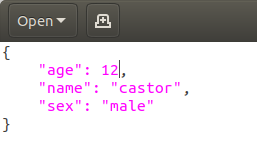简单好用的C++ json库——JSON for Modern C++
github传送门为:https://nlohmann.github.io/json/
简介
首先这个库不是奔着性能去的,设计者考虑的是:直观的语法(Intuitive syntax)、微小的整合(Trivial integration)、认真的测试(Serious testing)
至于内存效率和速度,反倒不是优先考虑的。
先说说微小的整合。在项目中只需要包含一个json.hpp的单个头文件就可以了,为了便于编程,使用命名空间会更加方便:
1 2 3 | #include <json.hpp>//...using json = nlohmann::json; |
火线入门
1 2 3 4 5 6 7 8 9 10 11 12 13 14 15 16 17 18 19 20 21 22 23 24 | #include <iostream>#include <fstream>#include <iomanip>#include "json.hpp"using namespace std;using json = nlohmann::json; int main(){ cout<<"Json test"<<endl; json j; j["name"]="castor"; j["sex"]="male"; j["age"]=12; cout<<j<<endl; string s="xdfile.json"; ofstream outFile(s); outFile<<setw(4)<<j<<endl; return 0;} |
可以看到,使用起来还是非常直观的,json类就像是一个cpp的原生类一样方便操作,还重载了<<。所写的文件打开如下:

同时也会发现, json对键进行了排序,应该是使用了map的缘故。
从字符串到Json对象
通过字符串解析:
一种方式是使用_json:
1 2 3 4 5 6 7 8 9 10 11 12 13 14 15 16 | #include <iostream>#include <fstream>#include <iomanip>#include "json.hpp"using namespace std;using json = nlohmann::json; int main(){ cout<<"Json test"<<endl; json j; j="{ \"happy\": true, \"pi\": 3.141 }"_json; cout<<setw(4)<<j<<endl; return 0;} |
或者,直接使用原始字符串的方式:
1 2 3 4 5 6 | j = R"( { "happy": true, "pi": 3.141 })"_json; |
或者使用json::parse:
1 | j=json::parse("{ \"happy\": true, \"pi\": 3.141 }"); |
都将显示:
1 2 3 4 5 | Json test{ "happy": true, "pi": 3.141} |
获取对象的字符串
需要提取其中的字符串时,使用j.dump()即可,如果提供一个整型参数,还可以缩进,例如一般我们用四个字符的话,就可以用j.dump(4),所以上面的例子中,不使用setw的话,可以这样写:
1 | cout<<j.dump(4)<<endl; |
另外一个方法是使用j..get<std::string>()方法,get获取的是原始字符串,而dump则是获取的序列化(serialized )的字符串值。
流操作
以文件流为例,读文件创建json对象:
1 2 | ifstream i("xdfile.json");i >> j; |
至于写文件,和写标准输出流没什么差别,前面的火线入门已经展示过。




【推荐】编程新体验,更懂你的AI,立即体验豆包MarsCode编程助手
【推荐】凌霞软件回馈社区,博客园 & 1Panel & Halo 联合会员上线
【推荐】抖音旗下AI助手豆包,你的智能百科全书,全免费不限次数
【推荐】博客园社区专享云产品让利特惠,阿里云新客6.5折上折
【推荐】轻量又高性能的 SSH 工具 IShell:AI 加持,快人一步
· [.NET]调用本地 Deepseek 模型
· 一个费力不讨好的项目,让我损失了近一半的绩效!
· .NET Core 托管堆内存泄露/CPU异常的常见思路
· PostgreSQL 和 SQL Server 在统计信息维护中的关键差异
· C++代码改造为UTF-8编码问题的总结
· 一个费力不讨好的项目,让我损失了近一半的绩效!
· 清华大学推出第四讲使用 DeepSeek + DeepResearch 让科研像聊天一样简单!
· 实操Deepseek接入个人知识库
· CSnakes vs Python.NET:高效嵌入与灵活互通的跨语言方案对比
· Plotly.NET 一个为 .NET 打造的强大开源交互式图表库